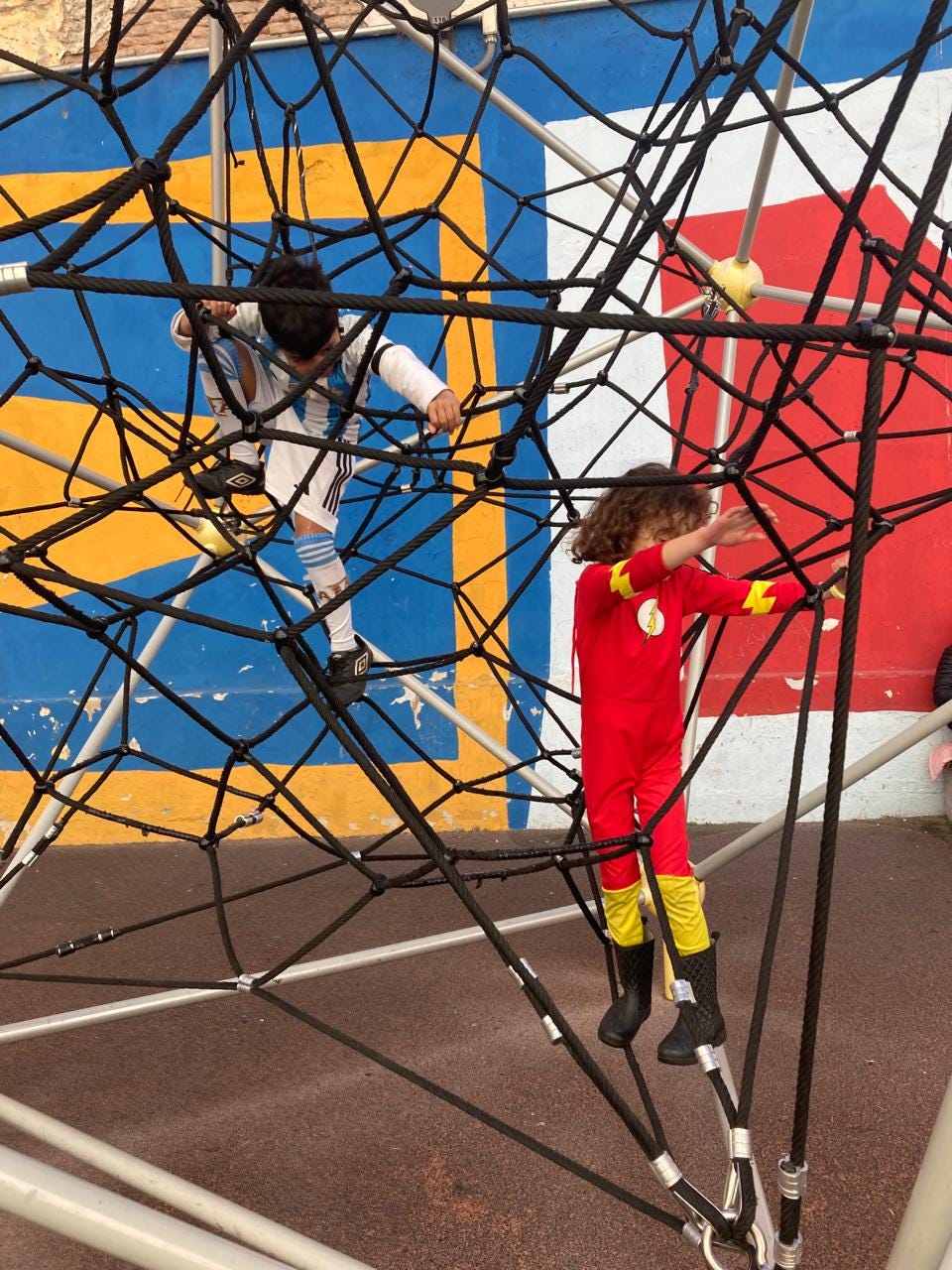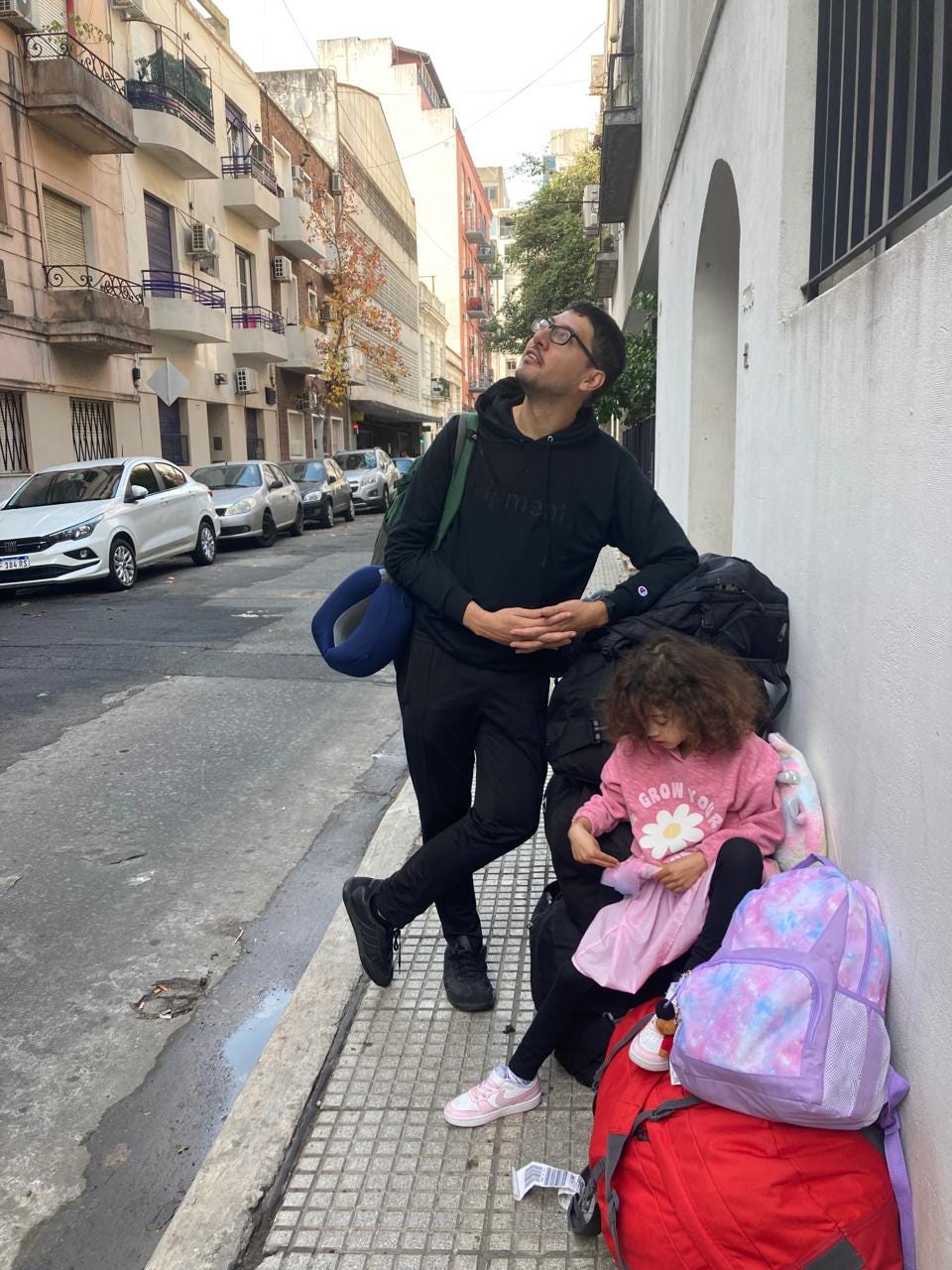Lessons learned from travelling full-time with a family. Lesson 1: don’t do it
Back in the summer of 2022, my husband and I decided to pack up our life in Cape Town and travel the world with our two young children. This is the story of the lessons we learned.
Full-time family travel is an act that comes with rewards and risks. The real downside is social (you and your kids will miss friends and family) and cultural (depending on where you go, you might have to endure a difficult adjustment period). But often, those are opportunities disguised as drawbacks. Learning different cultures is incredibly enriching as is forming new friendships. Doing this together is deeply transformative.
For us, leaving Cape Town to see more of the world was the plan. Deciding on the next destination wasn’t as straightforward. We ranked countries on things like visa options, safety, cost of living and imagined lives in Mexico and Portugal. (Note: None of those would come to pass but what did happen was absolutely life-changing.)
Finally, we settled on moving to Namibia - where my husband grew up. Two years later, we’d lived across three countries: South Africa, Namibia, and Argentina. Here’s some of the lessons we learned.
An addendum to what you’ll read here: I am honest in sharing our experiences but I won’t be going in-depth into any negative emotions. Know that there were challenges but I’ll only share about a difficult situation in detail when it’s solely my individual experience to share.
Children’s social lives become a priority
By the time he blew out on the candles on his ninth birthday cake in Buenos Aires, my son had spent celebrated his birthday in a different country each year for previous two years.
I wanted my children to experience greater cultural awareness, and we achieved that - but at what cost? A steep one if you pick up a random research paper into the impact of relocation on children’s social lives. Studies exploring the effects of moving on children’s friendships like this one present a bleak picture of the social lives of kids who move around regularly.
But none of these were current or relevant to our situation. These studies focused on families who moved because they had relocated for military, diplomatic, or corporate positions. Digital nomad families have a greater say in where they go. Often older kids are deeply involved in trip planning.
For example, the Young family, a digital nomad family from the United States, adapted their travel schedule as their children got older:
“Our kids are at that age now where they're developing more lasting friendships and wanting to do things like hanging out with those friends all the time. Being on the road three or four months at a time makes that really hard. So, we've transitioned to shorter chunks of travel, to give more freedom and flexibility to the kids.”
What made the biggest difference for us was becoming ruthlessly proactive in setting up opportunities to socialise. That meant hanging out in parks, joining parent Facebook groups, and saying yes to every birthday party invite. But then, existing friendships also need to be nurtured. Setting up calls and playdates whenever you’re back in town helps maintain these bonds.
At the time of writing, my older children are 9 years and 6 years old. They have made friends across countries. Both are still open to traveling, but this season of life will change. My husband and I predict we’ll need to stay in one place as the eldest gets into his teen years.
Experiment with different types of learning
Parental concern over a child’s academics during a big move is nothing new. Most of us take steps to ensure that our children are keeping up with the material and seek support if they’re struggling. These concerns are amplified when schooling on the road.
A common thread in older research is to link any kind relocation to a decline in academic performance. When a student body is “highly mobile” schools “perform less well”, per a policy brief from the MacArthur Foundation. What’s missing from the studies, though, is a focus on alternative schooling. And in an era that’s seeing more and more families choosing to homeschool or unschool, this is a huge blind spot.
Give yourself space for trial and error. If you’re open to trying different schooling options, you could find that works better. I had the ambitious plan of homeschooling my then seven-year old. This did not go down well. An online programme saw him thrive academically - but lacked the social value of spending time with peers.
By researching alternative schooling options, I ended up rethinking the education system. After reading through a few unschooling books and performing my own research, I found I had less fear about my children falling behind. Suddenly, I was open to alternative forms of learning.
Now, I’m far more concerned about helping them take control of their learning and ensuring they enjoy the process. Both kids attend Montessori and it’s a system that’s available in most countries with part-time options.
Learn a new language together
I’ve seen language immersion produce varying levels of success depending on how it’s done. Exhibit A: child attends a foreign-language school and doesn’t pick up much of the language. (Also starts to dislike going to school). Exhibit B: the child thrives quickly, picking up a lot of the language. A big difference was that in the second case, the entire family was making an effort to learn the new language alongside the child.
If you’re going to a country where the children will need to be proficient in an additional language, try a bilingual school where a decent percentage of the student body already speak your first language. It’s tempting to want to surround your child with the language. BUT. Starting a new school is enough on its own without a language barrier.
Investing in 1:1 lessons pays off quickly. At one stage, I had in-person lessons set at a bi-weekly cadence. Finally, and this is huge, language learning content for children is not scarce. Today, if there’s a language they want to learn, their favourite cartoon is probably freely available in that language.
Again, making this a family affair is fun - and more effective. As a result of a our travels, we’ve all committed to learning Spanish and take time to work on our skills together.
Make connections before you arrive
Planning your first trip as a digital nomad family can be overwhelming. You have to consider flights, packing lists, visas, childcare, health insurance, and more. It’s a lot.
Fortunately for us, information and contacts are widely available online. Consider joining different Facebook Groups to learn more about family activities and schooling in each area. Most times, you can perform a group search to find answers to frequently asked questions. People want to help. Making friends - even just one person - before you get there makes for a softer landing. I had recommendations for schools, nannies, and extra-murals long before we arrived.
And the rise of the location-independent lifestyle means there are more services available to assist you throughout the process. For example, Nomadlist is an online community for remote workers. A Nomadlist membership gives you access to country rankings, remote job listings, local meet-ups, and more. There are even companies like Boundless Life that provide packages including accommodation, co-working facilities, and childcare.
Establish a base
Traveling with most of your clothes is more of a hassle than an adventure. You begin to feel unmoored.
Because we were traveling with almost everything we owned, we took ages to move through airports. It became an ordeal to check with multiple bags - and multiple kids - in tow. Future trips will be done from a base. That is, a place where we live and are settled.
We’re no longer entertaining the idea of moving to a new destination every six months. We want to give the children an opportunity to form deep friendships and it’s hard to do that if you start planning to leave just as you arrive.
Ignore everything I’ve just said
Everything written here is biased. What was presented as fact is actually just a unique human experience coloured by my personal factors.
Context is incredibly important and often lacking in pieces like these. What you value and your comfort threshold all contribute to how you’d perceive living this kind of life. Your personality - your child’s personality - will change the dynamics.
If you’re going to embark on this experiment, you should begin by deciding on your values and goals. What would be required to make the journey worth your while. Agree on those values and goals and then start planning.




